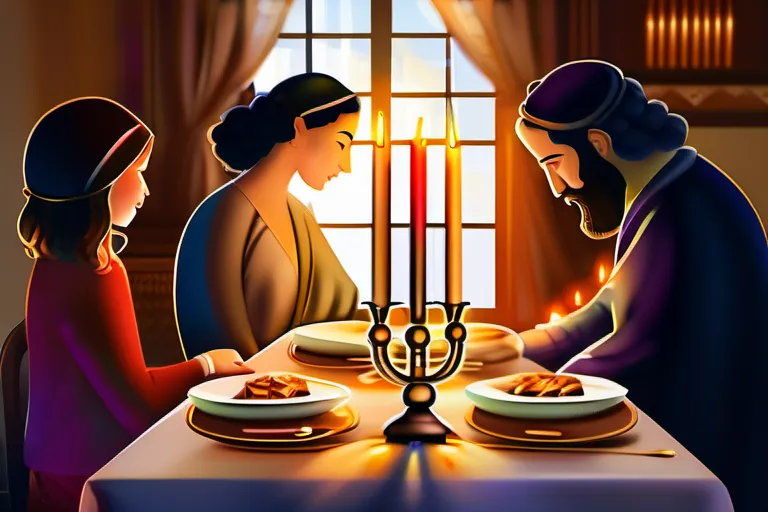Explore the religious, cultural, and historical significance of Shabbat in Judaism.
Saturday, or Shabbat, is a day of rest and spiritual reflection for Jews worldwide. In this article, we delve into the profound meaning behind Shabbat and its importance in Jewish culture and tradition.
The Origins of Shabbat
The origins of Shabbat, the Jewish Sabbath, are deeply rooted in the narrative of creation itself as described in the Genesis. Imagine for a moment stepping back to the beginning of time, when God created the heavens and the earth in six days. As you read through the story, can you feel the anticipation building up to that final day? The seventh day, on which God rested, is not just a conclusion but a profound act that laid the groundwork for Shabbat.
In Exodus, we find the first explicit mention of Shabbat in Jewish history. The commandment given to Moses was clear: ‘Remember the Sabbath day by keeping it holy.’ But why did God choose this particular day? Was there a chance He could have picked any other, or was Saturday specifically chosen for a reason?
One interpretation is that Shabbat symbolizes the eternal cycle of creation and rest. Just as the universe pauses on its seventh day, so too should humanity—engaging in activities that are purely devotional and not driven by the demands of work. It’s a metaphorical break from the relentless cycle of labor and strife, offering a glimpse into a world where peace and tranquility prevail.
The commandment to observe Shabbat is not just a historical artifact but a living tradition. Through its observance, Jews are reminded of their bond with God and the sanctity of time itself. The day serves as a bridge between the past and the future, connecting generations through shared rituals and traditions. It’s a journey back in time to a moment when the world was new and humanity had the chance to rest.
Shabbat, therefore, is more than just a day; it’s a narrative of creation, redemption, and renewal. Each week, as Jews gather for prayers, meals, and communal activities, they retell the story of their ancestors and reaffirm their faith in the divine order of the universe. In doing so, Shabbat becomes a living testament to the enduring power of tradition and the importance of rest in our lives.
The Commandment of Shabbat
In the heart of Jewish tradition lies the Shabbat, a day that has woven itself into the fabric of religious, cultural, and historical significance for millennia. Imagine if every week, life paused just long enough to remind us of something profoundly important—this is Shabbat in Judaism.
The Ten Commandments stand as the bedrock of Jewish law, each one carrying its own weight in wisdom and instruction. But which commandment truly captures the essence of rest and reflection? The fourth commandment, ‘Remember the Sabbath day, to keep it holy,’ is not just a mere obligation; it’s a profound invitation into the sacred.
Why does this commandment stand out? It’s like a golden thread running through the tapestry of Jewish life. Just as a river carves its path over time, Shabbat has shaped the course of Jewish history and culture, leaving an indelible mark on every aspect of life.
How did Shabbat become such a central part of Jewish identity? It began in the Bible, with God’s command to rest after creating the world. The story of the creation, where God worked six days and then rested on the seventh, sets a powerful precedent. This act of divine rest became a cornerstone for the Israelites, who were commanded to follow suit.
Shabbat is more than just a day off; it’s a reminder that there are things in life worth pausing for. It’s about finding balance amidst the chaos, about taking time to reflect and rejuvenate. In essence, Shabbat invites us to step back from our daily routines and connect with something deeper—a connection to God, community, and ourselves.
Can we truly understand the significance of Saturday without delving into its roots? The commandment of Shabbat isn’t just a set of rules; it’s a way of life. It’s about honoring the day, preserving tradition, and maintaining that precious balance between work and rest. In this sense, Shabbat is more than just a day—it’s a journey towards holiness.
Shabbat Observances
As we delve into Shabbat Observances, let’s consider why lighting candles on Friday evenings feels like marking the beginning of a special, almost magical time. Imagine stepping into a world where technology and the constant hum of daily life pause for just one day—this is what Shabbat offers to Jews around the globe.
Candle lighting isn’t merely about setting a mood; it’s a symbolic act that brings light into homes and lives. These candles, often accompanied by blessings in Shalom Aleichem, are more than just flammable wicks—they’re the first step in creating an atmosphere of tranquility and holiness. How many times have you felt the warmth of the candlelight enveloping your home, signaling that it’s time to rest and reflect?
Kiddush, or sanctification over wine, is another ritual deeply rooted in Shabbat traditions. This moment marks the official start of the Sabbath as a holy day set apart from the mundane. As you raise your glass, savoring the taste of the wine and reciting the blessing, do you wonder about the significance of this simple yet profound act? Is it just about drinking or is there something more spiritual at play?
Havdalah, the ritual concluding Shabbat, serves as a bridge between the sacred day and the week that follows. This ceremony with its spices, candle, and blessings over wine and bread, feels like saying goodbye to a fleeting moment of divine connection and welcoming the ordinary back into our lives. It’s almost as if we’re touching a metaphorical handrail, preparing for another journey through life.
These rituals are more than just religious duties; they weave a tapestry of traditions that connect generations and cultures. Through these acts, Jews around the world reaffirm their commitment to Mitzvot, or commandments, honoring not only God but also each other in this shared practice.
As you participate in these customs, do you find yourself wondering about the impact of Shabbat on your life? How does it shape your week and your beliefs?
The Spiritual Significance of Shabbat
The spiritual significance of Shabbat in Judaism cannot be overstated. It’s like a bridge between the mundane and the divine, allowing Jews to connect deeply with their faith on this holy day. Imagine Shabbat as a garden where one can find solace from the chaos of daily life, nurturing the soul amidst the busy seasons of work and family. This spiritual aspect is rooted in the Torah itself, where God sanctifies the seventh day, making it a day set apart for rest and reflection.
In Jewish mysticism, or Kabbalah, Shabbat takes on even greater depth. It’s not just about refraining from labor but also engaging in a profound spiritual journey. One can ponder how the idea of rest itself becomes a form of worship, as described in the verse: ‘So God blessed the seventh day and made it holy, because on it God rested from all his work.’ The act of desisting from work allows one to engage more fully with spiritual practices such as prayer, study, and enjoying the company of loved ones. It’s a time for introspection and renewal.
The Kabbalistic view sees Shabbat as a time when the barriers between the physical and spiritual worlds are lifted, allowing divine energy to flow freely. This concept is beautifully encapsulated in the phrase ‘Shalom Bayit,’ which means peace in the home, symbolizing harmony with both the natural world and the spiritual realm. The rituals of lighting candles and singing blessings become more than just customs; they are profound acts that enrich one’s connection to God and the community.
Moreover, Shabbat serves as a reminder of creation itself, mirroring the pattern of rest after six days of work. This reflection encourages believers to see the world in a new light, appreciating the wonders of nature and human achievement. It’s a reminder that even the busiest lives can find moments of peace and reflection amidst the daily grind.
The spiritual significance of Shabbat is not merely theoretical; it’s a living, breathing aspect of Jewish life that has endured for centuries. Whether through prayer, study, or simply spending time with family, each act carries weight and meaning, reinforcing the bond between individuals and their faith. As we delve into the modern challenges faced by Jews in observing Shabbat, these spiritual aspects remain as crucial as ever, providing a guiding light through the complexities of contemporary life.
Shabbat in Modern Times
Imagine stepping into a time machine, traveling back to centuries past where Jewish families would gather around flickering candlelight and fragrant candles to honor Shabbat. The practice of observing Shabbat has evolved over millennia, adapting to modern times while preserving its essence. Today, Jews face new challenges in maintaining this ancient tradition.
How do contemporary Jews manage to keep the spirit of Shabbat alive amidst the relentless pace of modern life? Is it easier or harder now than ever before?
- Some argue that technology and connectivity pose significant barriers to traditional observance. How do Jews integrate their smartphones, laptops, and social media into a world where Shabbat is supposed to be a respite from the digital age?
- The workweek has expanded, leaving less time for Shabbat preparations. How do families balance their professional lives with their spiritual duties during this holy day?
Yet, despite these modern hurdles, many Jews find that Shabbat remains a vital part of their identity and faith. The tradition of lighting candles before dusk, singing hymns, and sharing meals together serves as a reminder of the importance of community and family.
How do you ensure that your Shabbat observance is meaningful in today’s world? Do you face unique challenges or are there new customs that have emerged to adapt to contemporary life?
The significance of Saturday, now known as Shabbat, extends far beyond the simple act of resting. It is a bridge between past and present, a symbol of hope and renewal in every generation.
The Impact of Shabbat on Jewish Identity
Imagine walking into a synagogue on a Friday evening, where the air feels charged with anticipation and holiness. The Sabbath, commonly known as Shabbat in Judaism, is not just a day but a profound shift in the fabric of Jewish identity. How does this one day manage to shape so much?
Historically, Shabbat has been the cornerstone around which Jewish life revolves. It’s like a beacon that guides the community through the chaos of daily existence. By marking seven days with a day of rest and reflection, Jews maintain their unique identity in a world often dominated by ceaseless activity.
In today’s fast-paced society, Shabbat serves as a sanctuary from modern pressures. Families come together to share meals and prayers, strengthening bonds that might otherwise be overshadowed by the demands of work or social media. It’s a time when the soul finds solace in tradition and community.
Shabbat is more than just a day off; it’s a sacred ritual that weaves through generations like an unbroken thread. Each Shabbat, Jews around the world light candles, sing hymns, and recite prayers, all while enjoying meals with loved ones. These rituals are not just surface-level practices but deeply ingrained habits that define Jewish culture.
So, how does this day of rest shape Jewish identity? It’s through the act of observing Shabbat that Jews reaffirm their commitment to a heritage steeped in tradition and faith. This daily ritual of setting aside work and worries creates a sense of continuity and belonging that transcends time.
Shabbat is like a river that flows through history, carrying with it the memories and values of those who have come before us. In every Shabbat observance, we honor not only our ancestors but also our future selves, ensuring that the light of tradition continues to shine brightly in the world.
Reflecting on how Shabbat influences Jewish identity makes one realize its significance extends far beyond a simple day off. It’s a profound reminder of the enduring power of community and faith, woven into the very fabric of who we are as Jews.
Conclusion
 By understanding the significance of Shabbat, we gain a deeper appreciation for Judaism’s rich history and traditions. Let us continue to honor and observe this sacred day with reverence and respect.
By understanding the significance of Shabbat, we gain a deeper appreciation for Judaism’s rich history and traditions. Let us continue to honor and observe this sacred day with reverence and respect.











